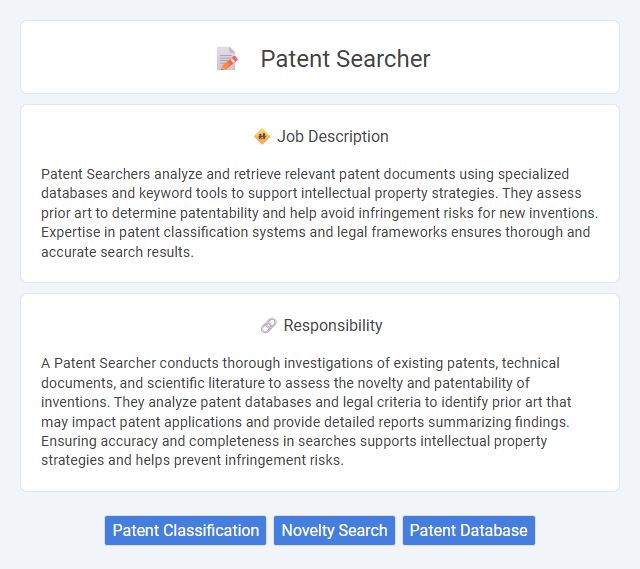
Patent Searchers analyze and retrieve relevant patent documents using specialized databases and keyword tools to support intellectual property strategies. They assess prior art to determine patentability and help avoid infringement risks for new inventions. Expertise in patent classification systems and legal frameworks ensures thorough and accurate search results.
Individuals with strong analytical skills and attention to detail are likely to be well-suited for a Patent Searcher role, as the job requires thorough examination of complex technical documents. People who enjoy research and possess a high level of patience may find this position fulfilling, given the repetitive nature of searching through extensive patent databases. Those less inclined toward meticulous investigation or who struggle with prolonged concentration might find the role challenging and potentially unsuitable.
Qualification
A Patent Searcher must possess strong analytical skills and expertise in intellectual property law, alongside proficiency in patent databases such as USPTO, EPO, and WIPO. Advanced knowledge in specific technical fields, such as engineering, biotech, or software, enhances accuracy in prior art searches and patentability assessments. Attention to detail, excellent research capabilities, and the ability to interpret complex legal and technical documents are essential qualifications for effective patent search operations.
Responsibility
A Patent Searcher conducts thorough investigations of existing patents, technical documents, and scientific literature to assess the novelty and patentability of inventions. They analyze patent databases and legal criteria to identify prior art that may impact patent applications and provide detailed reports summarizing findings. Ensuring accuracy and completeness in searches supports intellectual property strategies and helps prevent infringement risks.
Benefit
A Patent Searcher likely increases the probability of identifying relevant prior art, which helps reduce the risk of patent infringement and strengthens patent applications. Accurate patent searches may improve the efficiency of the patent filing process, potentially saving time and costs for inventors and companies. Expertise in patent databases and search strategies probably enhances the quality of intellectual property decisions and portfolio management.
Challenge
The Patent Searcher role likely involves navigating complex patent databases, requiring strong analytical skills and attention to detail. Challenges may arise from the need to interpret technical jargon across various industries and quickly identify relevant prior art. There is a probability that evolving patent laws and frequent updates to databases will also demand continuous learning and adaptability.
Career Advancement
Patent Searchers enhance their expertise by mastering advanced patent databases and understanding complex legal frameworks, which leads to greater career opportunities in intellectual property firms and corporate R&D departments. Proficiency in patent analytics and legal patentability assessments can result in promotions to senior searcher roles, patent analyst positions, or patent portfolio management. Continuous skill development in emerging technologies and patent law updates significantly boosts career growth potential within the patent information and innovation sectors.
Key Terms
Patent Classification
Patent Searchers specialize in identifying and categorizing patents based on specific technological fields using established patent classification systems such as the International Patent Classification (IPC) and Cooperative Patent Classification (CPC). Accurate patent classification enhances the efficiency of prior art searches, enabling organizations to assess patentability and avoid infringement risks effectively. Advanced knowledge of patent databases and classification schemes allows Patent Searchers to deliver precise and comprehensive patent landscape analyses critical for intellectual property strategy development.
Novelty Search
Patent searchers specializing in novelty search systematically analyze existing patents, scientific literature, and technical disclosures to identify prior art that may impact the patentability of an invention. They utilize advanced databases and keyword strategies to uncover relevant documents ensuring the uniqueness and innovation of new patent applications. Their thorough investigations help inventors and legal teams assess the novelty and validity of patent claims, minimizing the risk of infringement and enhancing intellectual property protection.
Patent Database
Patent searchers specialize in examining comprehensive patent databases such as USPTO, EPO, and WIPO to identify relevant prior art and assess patentability. Their expertise includes analyzing technical classifications, legal status, and citation networks within these databases to support intellectual property strategies. Proficiency in advanced search algorithms and Boolean operators enhances the accuracy and efficiency of patent landscape analysis.
 kuljobs.com
kuljobs.com